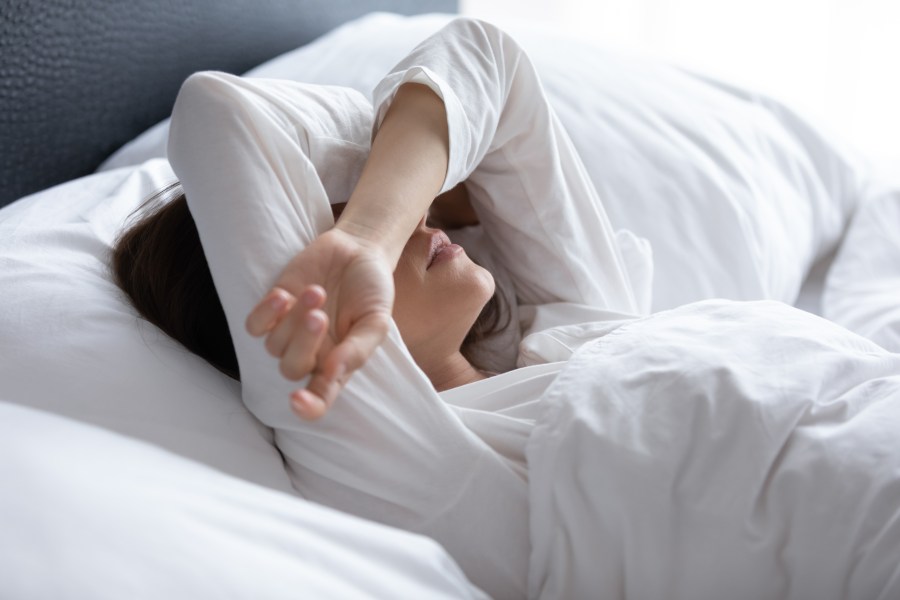Getting a good night’s sleep is essential for maintaining good health and well-being.
However, for many people, achieving quality sleep can be a challenge. Sleep Expert Matthew Walker suggests that there are several ways to improve sleep habits and get the most out of our beauty rest.
According to Walker, the author of the best-selling book “Why We Sleep,” there are five critical tips for getting better sleep.
Walker said these tips and tactics can help individuals fall asleep faster, stay asleep longer, and wake up feeling refreshed and energized.

Establish a regular sleep schedule
The first tip is to establish a regular sleep schedule. Our bodies thrive on routine, and setting a consistent sleep schedule can help regulate our internal clock. Walker recommends going to bed and waking up at the same time each day, even on weekends. This routine helps set our circadian rhythm and promotes more restful sleep.
Create a sleep-conducive environment
The second tip is to create a sleep-conducive environment. Our sleeping environment plays a significant role in the quality of our sleep. To create a peaceful and relaxing sleep environment, Walker suggests keeping the bedroom dark, quiet, and cool. Additionally, he recommends investing in a comfortable mattress and pillows and removing electronic devices from the bedroom to minimize disruptions.
Another important consideration is the role of bedroom noise in disrupting sleep. Even low-level noise can interfere with the quality of sleep, so it is important to minimize noise as much as possible. This can include using earplugs or a white noise machine to block out external sounds.
It is also important to consider the quality of the air in the bedroom. Poor air quality can lead to breathing difficulties and disrupt sleep. To promote better air quality, it is important to keep the bedroom well-ventilated and free from dust and allergens. This can include using an air purifier or regularly dusting and vacuuming the bedroom.
Establish a relaxing bedtime routine

The third tip is to establish a relaxing bedtime routine. Engaging in relaxing activities before bed can help signal to the body that it’s time to wind down and prepare for sleep. This can include taking a warm bath, reading a book, or practicing relaxation techniques such as meditation or deep breathing exercises.
To promote better sleep quality, individuals can also try relaxation techniques such as meditation, yoga, or deep breathing exercises before bedtime.
Limit exposure to blue light before bedtime
The fourth tip is to limit exposure to blue light before bedtime. Blue light is emitted by electronic devices such as smartphones, tablets, and computers, and exposure to it before bed can disrupt the production of the sleep hormone melatonin. To minimize exposure, Walker suggests turning off electronic devices at least one hour before bedtime or using blue-light blocking glasses.
Limit caffeine and alcohol consumption
The fifth and final tip is to limit caffeine and alcohol consumption. Caffeine is a stimulant that can interfere with sleep, and alcohol can disrupt sleep patterns and prevent deep, restorative sleep. Walker recommends limiting caffeine consumption to the morning hours and avoiding alcohol consumption before bedtime.
It is also worth noting that certain medications can interfere with sleep quality. This can include medications for high blood pressure, asthma, and depression. If an individual is taking medication and experiencing sleep problems, they should speak with their healthcare provider to see if there are alternative medications or strategies that can be used.
Tips for maintaining an ideal sleep environment
Sleep hygiene is the set of practices and habits that promote healthy and restful sleep.
Maintaining good sleep hygiene is essential for improving sleep quality and preventing sleep disorders.
Here are some tips for maintaining a clean sleep environment and proper sleep posture:
- Keep the bedroom clean and tidy: A clean and organized bedroom can promote relaxation and reduce stress. Ensure that the bed is made and that clutter is minimized to create a peaceful and restful environment.
- Invest in quality bedding: A comfortable mattress, pillows, and linens can significantly impact sleep quality. It’s essential to invest in quality bedding that promotes comfort and supports proper sleep posture.
- Maintain a cool and quiet sleep environment: Keep the bedroom cool, quiet, and dark to promote restful sleep. Use blackout curtains, earplugs, or a white noise machine if necessary.
- Practice proper sleep posture: Sleeping in the correct position can help prevent neck and back pain and promote restful sleep. It’s recommended to sleep on your back or side with a pillow that supports the natural curve of the neck.
- Limit screen time before bed: Exposure to blue light from electronic devices can interfere with the production of the sleep hormone melatonin. To minimize exposure, avoid using electronic devices for at least an hour before bed or use blue-light blocking glasses.
- Establish a relaxing bedtime routine: Engaging in relaxing activities before bed can help signal to the body that it’s time to wind down and prepare for sleep. This can include taking a warm bath, reading a book, or practicing relaxation techniques such as meditation or deep breathing exercises.
By practicing good sleep hygiene, individuals can improve the quality and duration of their sleep and wake up feeling refreshed and energized. For more information on sleep hygiene, check out the National Sleep Foundation’s website, which provides resources and information on healthy sleep habits and sleep disorders.
More tips and strategies for improved sleep quality

In addition to the five critical tips for better sleep recommended by sleep expert Matthew Walker, there are additional tips and strategies that individuals can implement to further improve their sleep quality.
Avoiding large meals and nicotine before bed is recommended, as both can disrupt sleep. Large meals can cause indigestion and discomfort, while nicotine is a stimulant that can interfere with sleep.
Practicing relaxation techniques such as yoga or tai chi can help reduce stress and promote relaxation before bed. Research has shown that these practices can improve sleep quality and duration, as well as decrease symptoms of insomnia.
Other helpful tips for improving sleep hygiene include keeping a sleep diary to identify patterns and issues with sleep, using aromatherapy with relaxing scents such as lavender or chamomile, and trying cognitive-behavioral therapy for insomnia (CBT-I).
Additional resources and apps
In addition to the five critical tips for improving sleep habits, utilizing additional resources can further enhance the quality of sleep.
Sleep apps such as Sleep Cycle and Headspace provide personalized tips and exercises that can help individuals relax and fall asleep faster.
Sleep Cycle tracks sleep patterns and wakes individuals up during their lightest sleep phase, while Headspace offers guided meditations and mindfulness exercises.
Websites such as the National Sleep Foundation and Sleep Education offer additional resources and information on sleep disorders, sleep hygiene, and healthy sleep habits.
Check out these helpful resources:
Benefits of getting enough sleep
So what happens when you start sleeping better?
Getting enough sleep has numerous benefits for cognitive function, mood, and immune function.
Improved Cognitive Function: A good night’s sleep can improve cognitive functions such as memory, concentration, and problem-solving skills. Studies have shown that sleep is critical for consolidating memories and learning new information.
Better Mood: Lack of sleep can lead to irritability and mood swings, while adequate sleep can promote positive emotions, reduce stress, and improve overall well-being.
Boosted Immune Function: Sleep also plays a crucial role in immune function, helping the body fight off infections and disease. Lack of sleep has been linked to a weakened immune system, making individuals more susceptible to illnesses.
Getting enough sleep has also been associated with a lower risk of chronic health conditions such as obesity, diabetes, and cardiovascular disease. So it goes without saying that it’s crucial to prioritize good sleep habits and aim for 7-9 hours of sleep each night.
Putting it all together
Getting a good night’s sleep is essential for maintaining overall health and well-being.
Establishing a regular sleep schedule, creating a sleep-conducive environment, practicing relaxation techniques, limiting exposure to blue light, and managing caffeine and alcohol consumption can all contribute to better quality sleep.
Additionally, maintaining a healthy diet and exercise routine, managing stress, and seeking treatment for sleep disorders are further strategies that can improve sleep quality.
Remember that quality sleep is crucial for optimal health, so take the necessary steps to make it a priority in your life.







